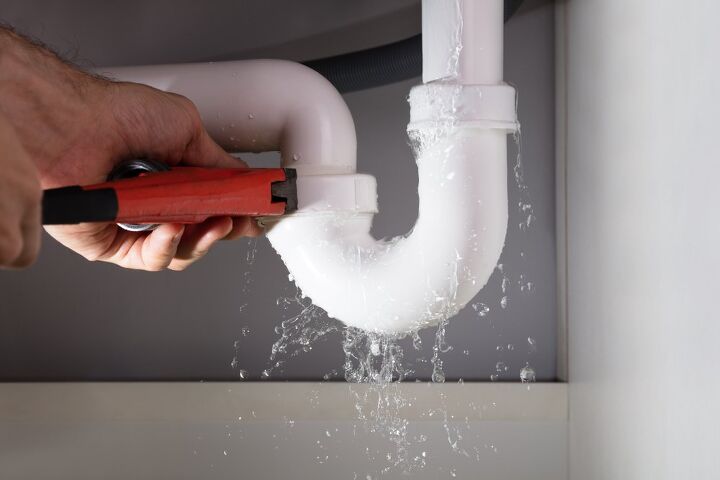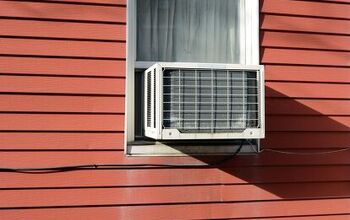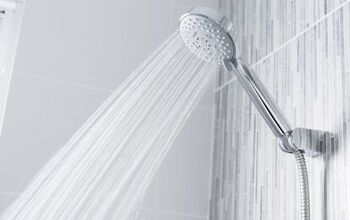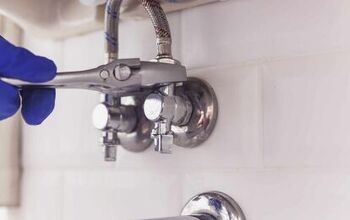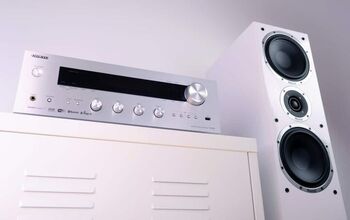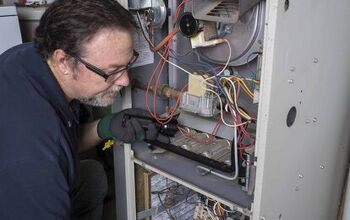Why Does My Plumbing Sound Like A Foghorn?

The plumbing system in your home is a complex one full of many different components. If you start to hear strange noises similar to a foghorn coming from your plumbing, there’s reason to be concerned. You should explore all of your options and try to get to the bottom of the issue immediately.
If your plumbing sounds like a foghorn, you have a problem somewhere within your plumbing system. A foghorn sound can be caused by your toilet, shower, water pipes, water heater, and many other components of your plumbing system.
A foghorn sound is similar to a deep, reverberating hum that rings in your ears even after the sound has stopped. Plumbing systems make many noises when things are amiss and a foghorn is one of them. In this article, we’ll look at some common causes for foghorn sounds in your plumbing and what to do about them.
Do You Need to Hire a Plumber?
Get free, zero-commitment quotes from pro contractors near you.

Why Does Plumbing Sound Like a Foghorn?
There are many reasons why your plumbing sounds like a foghorn and none of them are good. However, some of them are more serious than others. It’s important that you don’t ignore the issue, however, but that you get to the bottom of the problem. If necessary, you might even have to call in a professional, but we’ll get to that later.
Anything from your toilet to your water pipes to your water heater can cause a foghorn noise to occur.
Possible Places That Could be Causing Foghorn Noises With Your Plumbing
In order to fix your foghorn plumbing problem, you need to narrow down where the noise is coming from. Once you know where the noise is coming from, you can then proceed to come up with a solution. Let’s take a look at the different plumbing components that can make foghorn noises and what’s likely causing it.
Why Toilet Sounds Like Foghorn
Your toilet is one of the most common culprits behind foghorn noises. They aren’t overly complicated fixtures and have few moving parts. Those parts, however, can get damaged from time to time. The part that often causes a foghorn noise is the ballcock valve.
When you flush your toilet the ballcock valve, also known as the flapper, has the job of opening to let water back into the tank and then closing when it’s full. This then causes friction and a shuddering noise to emanate from your toilet. If it’s not the ballcock valve, another possible reason is that the washer assembly inside of the valve is broken.
Here’s what you should do to remedy this issue with the ballcock.
- Lift the lid off the top of the tank.
- Flush the toilet.
- If you hear the foghorn noise, lift the toilet float to the top.
- If this has fixed the noise problem then you’re good to go. Otherwise, you may have to replace the entire valve.
Faucet
A foghorn noise can also occur when you turn on a faucet to have running water. If that happens, then the faucet in question likely has a damaged faucet washer. The only thing that you can do on your own is try to twist and tighten the faucet screws in the hopes that things will tighten up and the sound will stop. If that doesn’t work, then your next best option is to call a professional plumber and let them replace the faucet or faucet washer.
Washer
Both dishwashers and washing machines are prone to the same problems and the same foghorn noises indicating those problems. As your washer or dishwasher is filling with water, it’s not uncommon to hear a loud rattling that can turn into a foghorn noise. This usually indicates that the valve is bad on either the hot water line or the cold water line.
Regardless of which valve is at fault, it’s important that you take care of the problem. Otherwise, one of your solenoid valves could bust and a massive water leak could result. Solenoid valves are tricky to work with and ones on your washing machine are difficult to get to. You’ll likely have to call in a professional plumber to fix a worn-out valve.
Why Does My Shower Sound Like a Foghorn?
Showers are rarely the cause of foghorn noise issues, but they’re not immune to them. There are washers and valves inside your showerhead that can get dirty if you’re using hard water. You’ll have to clean your showerhead or replace it to remedy the issue.
Why Do My Water Pipes Sound Like a Foghorn?
The first place that you should check if you hear foghorn noises is your water lines. The reason is partially that it’s commonly the issue, but there’s a more important reason. Foghorn noises in your water pipes can indicate a problem that could lead to a burst pipe.
This problem is usually as simple as tightening the pipes up or properly fastening them to the wall or ceiling. If you notice the pipes shaking as water is flowing through them, a foghorn noise is in the near future. If you secure the pipes and there are still strange noises, the problem lies elsewhere or you have a more series water pipe issue.
Pipes Inside Your Walls
If you check all of your appliances and all of your exposed water pipes and still can’t figure out where the noise is coming from, you’ve got a problem. There are plumbing pipes running all through your home, including behind your walls, below your floors, and above your ceiling. If you’ve exhausted all other possibilities, the only remaining option is that a pipe you can’t see is causing the foghorn noise.
It’s time to call in a professional plumber to fix the job. They know what to look for and how to track down your foghorn noise. They’ll check to make sure all your pipes are properly secured, that they haven’t worn out, and that you have the correct water pressure.
Water Heater
Your water heater is extremely important to have a comfortable and clean home. If it’s making a foghorn noise, you had better fix the problem immediately. The reason that water heaters make foghorn noises is usually that sediment has built up on the burners of the water heater.
Your water heater is often the recipient of hard water full of impurities. The dirtier your water is, the more likely you are to have sediment problems on your burners. To prevent this from happening, you should have your water heater serviced and flushed annually to keep it clean and foghorn free.
DIY Tips to Fix Foghorn Pipes
Whenever possible, people like to perform their own repairs in an effort to save money. This is ok, but it’s important to know what your limitations are. Without the proper tools and plumbing experience, it’s easy to make problems worse than they already are. Adjusting the float in your toilet, tightening washers, and fastening pipes are easy enough, but you should never do anything that you’re not comfortable with.
Call a Professional
If all else fails and you simply can’t get to the bottom of your foghorn plumbing issue, it’s time to call a professional. A professional plumber has the tools, skills, and knowledge necessary to solve your problem. It’s important that you get the problem fixed promptly to ensure that a more serious problem doesn’t happen.
Related Questions
How much does it cost to fix foghorn pipes?
The cost of fixing a foghorn pipe depends on where the problem is coming from. Replacing a pipe can cost anywhere from $100 to $300 depending on how long the work takes and what type of pipe you install.
Are foghorn noises common with old plumbing?
Foghorn noises are more common in old plumbing than they are in newer homes. The older your pipes and plumbing fixtures are, the more common foghorn noises are.
Do You Need to Hire a Plumber?
Get free, zero-commitment quotes from pro contractors near you.

Final Thoughts
Plumbing systems and pipes make all kinds of strange noises when something is amiss. A foghorn noise isn’t necessarily a plumbing emergency, but it’s something that you don’t want to persist. If you have trouble getting to the bottom of your problem or can’t fix it yourself, call a plumber and let them help you out.

Before I started writing, I worked for 6 plus years in the plumbing, electrical, and HVAC business. I was primarily an HVAC installer but also worked as a plumber and electrician. Now I'm a copywriter, focusing on home improvement content and guides.
More by Jalin Coblentz



